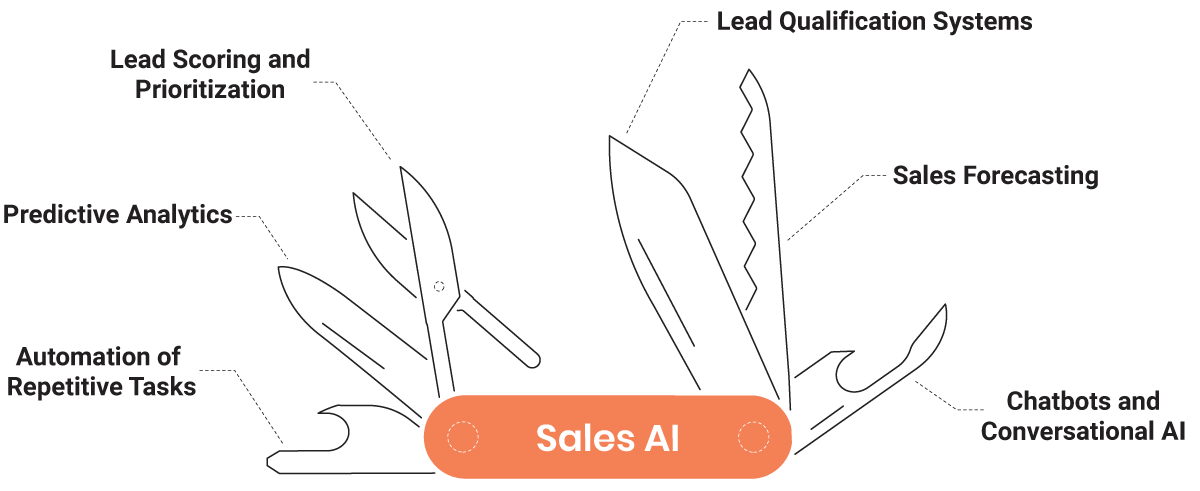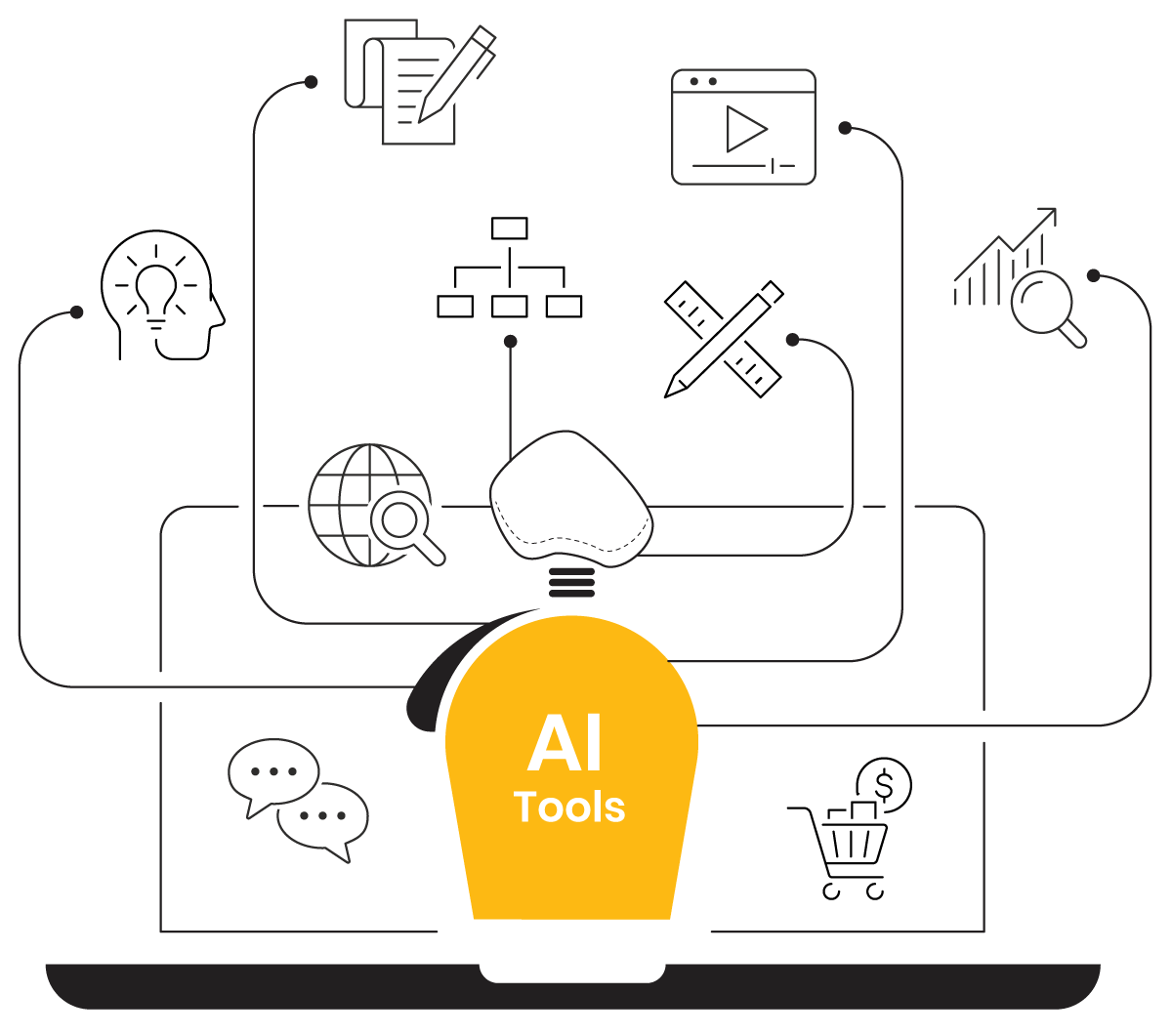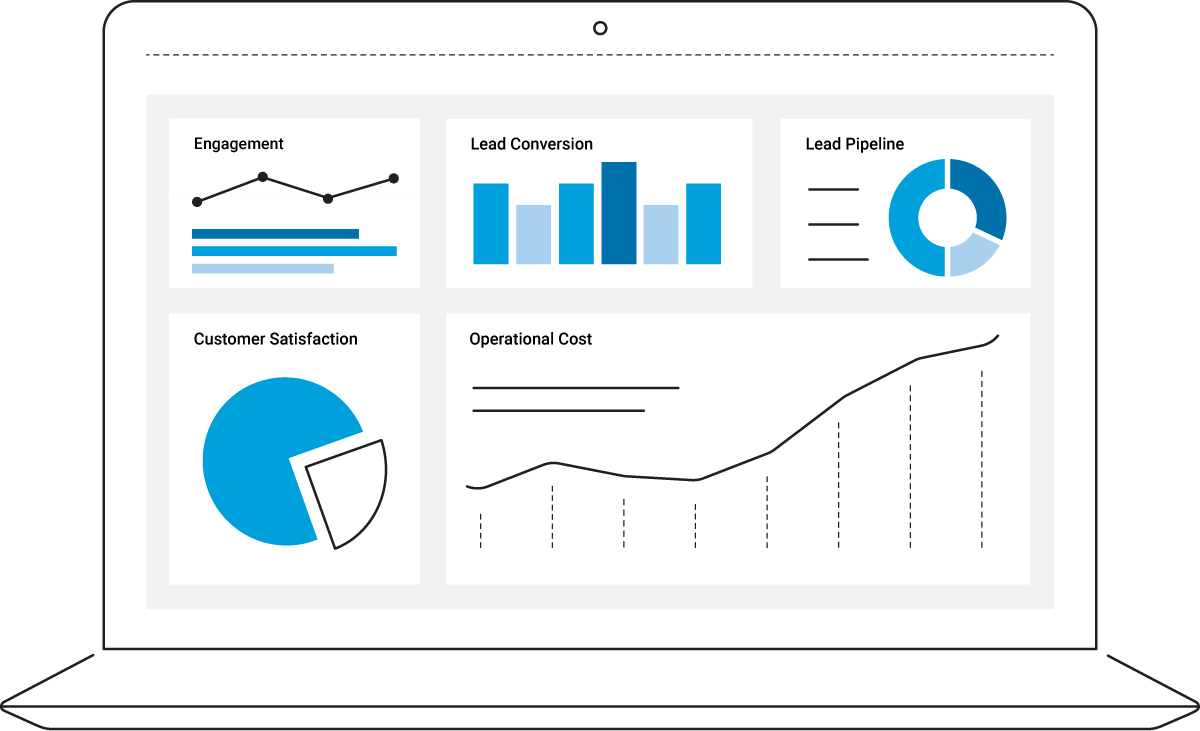Artificial Intelligence (AI) is no longer a luxury reserved for big businesses. Today’s AI tools are accessible, affordable, and specifically designed to help small and medium-sized businesses (SMBs) compete more effectively in the digital marketplace.
The Rise of AI in Sales and Marketing for SMBs
Once a futuristic concept exclusive to large enterprises, AI is now accessible for SMBs, helping streamline operations, enhance customer engagement, and improve decision-making through automation and predictive analytics.
General Overview of AI’s Rise
Today, SMBs are not just adopting AI—they’re relying on it to stay competitive. From automating repetitive tasks to anticipating customer behavior and uncovering growth opportunities, AI is transforming how smaller businesses operate and scale in real time.
AI Adoption by SMBs
According to Salesforce, 90% of SMBs already use AI in some form, with 60% adopting generative AI (GenAI).1 As AI tools become more user-friendly and affordable, SMBs across industries are leveraging them to stay competitive in a digital marketplace.
For example, hospitality businesses use AI-powered chatbots, automated booking, and personalized patient experiences for engagement and diagnostics. Retailers apply AI to inventory management and dynamic pricing. Tracking such trends highlights AI’s growing impact across diverse sectors.
General Benefits of AI for SMBs
AI-driven solutions are now essential for SMBs, delivering personalization, efficiency, and improved customer engagement. Unbounce reports that 89% of AI adopters believe these tools are critical to success in the next 12 months.2
AI provides SMBs with key advantages in sales and marketing:
- Improved targeting through analysis of customer behavior for personalized recommendations and marketing campaigns.
- Task automation for repetitive processes like email marketing, lead qualification, and customer support, freeing up valuable human time.
- Enhanced efficiency by reducing manual workloads as well as optimizing resources and facilitating decision-making.
Previously seen as tools for large corporations, AI-driven sales and marketing solutions are now essential for SMBs. As AI technology advances and adoption increases, these benefits will become even more significant, helping SMBs remain competitive in the digital age.
AI’s Role in Sales
While traditional enterprise-level AI might make you think of massive data centers and complicated algorithms, sales and marketing AI for SMBs is much more practical and accessible.
Think of sales AI as a Swiss Army® knife for your team—sorting customer data, predicting trends, and automating routine tasks so your people can focus on building relationships, solving complex problems, and closing deals.

The result? SMBs can compete successfully in crowded markets, driving strategic business growth with fewer resources.
Benefits of AI in Sales
AI enhances several key areas of sales, including:
- Lead scoring and prioritization by evaluating customer behavior to identify high-value prospects based on engagement signals.
- Predictive analytics using historical sales data to forecast trends for data-driven decisions.
- Automation of repetitive tasks, like follow-ups and appointment scheduling, allowing sales reps to focus on relationships and closing deals.
By optimizing sales processes, AI helps SMBs improve efficiency, close more deals, and scale operations without dramatically increasing costs.
General Examples of AI-Driven Sales Tools
Every customer interaction leaves an informative digital footprint; sales and marketing AI acts as an expert guide, helping businesses extract actionable insights. Predictive analytics takes this further—anticipating changes in customer behavior and sales patterns.
According to the Small Business and Entrepreneurship Council, 76% of small business owners say AI enables them to focus on high-value tasks like product development and strategic marketing.3 This shift from routine tasks to strategy-driven efforts allows teams to run more sophisticated campaigns targeting the right prospects at the right time, which yields improved conversions and efficiency.
AI-powered tools function as digital assistants for sales team:
- Lead qualification systems that prioritize prospects based on previous interactions
- Sales forecasting that uses historical trends to anticipate demand and revenue projections, which informs resource allocation decisions
- Chatbots and conversational AI for real-time customer engagement like answering questions and booking appointments
AI’s Role in Marketing
Customer experience is one of the only sustainable differentiators for long-term brand development. AI helps SMBs deliver personalized experiences efficiently, enabling them to scale and compete effectively in saturated markets.
Benefits of AI in Marketing
AI supports various marketing functions, including:
- Audience segmentation for better ad targeting and retargeting.
- Content creation and optimization for marketing copy and design.
- Omnichannel marketing automation across platforms to enhance audience engagement.
By automating repetitive tasks like prospect data entry, scheduling follow-ups for qualified leads, and basic market and customer data analysis to surface trends and opportunities, AI for small business marketing improves efficiency for higher conversion rates so teams get more done in less time for a better return on investment (ROI). Even more, they can focus their time on their most important priority—future customers.
General Examples of AI-Driven Marketing Tools

Practical AI marketing tools include:
- Chatbots for brainstorming, writing, researching, problem-solving, or just chatting things out (e.g., ChatGPT, Google Bard)
- GenAI for content creation, research, and marketing workflows (e.g., ChatGPT, Google Gemini, Jasper, Microsoft CoPilot)
- Tools for graphic design and video production (e.g., Canva, DALL-E, Zoom)
- Predictive analytics for campaign performance forecasting (e.g., IBM Watson Studio)
- Sales training tools that simulate buying scenarios (e.g., DreamPal, RoleplayAI)
Common Challenges and Solutions for SMBs Implementing AI
While adopting AI in sales and marketing can seem daunting, common challenges can be addressed through proactive strategy and practical process management.

Challenge: SMBs typically have more financial constraints than larger companies, resulting in resource constraints when investing in AI solutions.

Solution: The cost of not adopting AI could be significant, especially in terms of the impact on human time spent on repetitive or lower-return activities. Fortunately, 92% of businesses using AI report reduced operational costs.2 SMBs can minimize costs by prioritizing high-impact AI tools that maximize efficiency and ROI.
Ensure cost efficiency by using clean, organized data which reduces AI implementation costs and improves ROI by helping tools work more efficiently.

Challenge: Successful AI adoption hinges on everyday use, so a lack of technical proficiency presents challenges.

Solution: Upskill staff with free training resources, phased AI learning programs, and hands-on experience to help bridge knowledge gaps. Investing in continuous employee skill development ensures smooth AI integration.
Start small, think big. Sales and marketing teams don’t need to be AI experts overnight—build skills gradually leveraging each success for the next.

Challenge: AI integration can be complex, particularly for SMBs without dedicated IT staff.

Solution: Businesses can mitigate integration challenges by creating an AI adoption roadmap, leveraging no-code solutions, and working with consultants on a project basis as needed.
Risks of Implementing AI in Your SMB
Like any powerful tool, AI comes with potential risks that need careful management. Following are the risks and what businesses can do to minimize them.
Potential Risks
Misuse of AI: Establish clear usage policies and train employees on responsible AI practices.
Loss of Creativity: Balance AI-driven automation with human innovation by using AI as a support tool rather than a replacement for creative decision-making.
Legal Concerns: Implement plagiarism checks and consult legal experts to ensure compliance with intellectual property laws.
Impersonal Customer Interactions: Find the sweet spot where technology amplifies human connection. AI should enhance—not replace—meaningful customer relationships.
AI Bias and Ethical Concerns: Research tools and vet AI vendors to understand how they address bias in AI training. Establish ethical guidelines for data collection and decision-making.
AI Hallucinations and Misinformation: Implement regular human oversight and fact-checking to ensure that AI outputs are reliable and trustworthy.
Measuring the ROI of AI in SMB Sales & Marketing
Monitoring key indicators that match business goals ensures AI investments deliver value. Consider the numbers that matter most: reduced operational costs, time saved through automation, and revenue growth – both direct and indirect.

Focus on key ways to gauge ROI from AI tools in sales and marketing:
- Operational cost reduction, including employee performance and productivity, from automation and efficiency improvements – and be sure to include data accuracy and error rates as well
- Lead conversion and pipeline growth improvements as AI improves prospect qualification and conversion rates
- Engagement analytics via click-through rates and customer interactions with promotions and email campaigns
- Customer satisfaction and response times improvements for service speed and quality
Together, these metrics demonstrate how AI is transforming operations and driving impact on revenue, efficiency, and overall business success.
Data Quality: The Foundation for AI Success
As businesses increasingly turn to AI, one critical factor often determines success: data quality.
The Importance of Clean Data
AI effectiveness depends on structured, organized, quality data—a vital element that SMBs can overlook. Using AI without quality data is like having a sports car with poor fuel: it won’t get very far. Even the most sophisticated sales and marketing AI can’t turn messy data into meaningful insights. SMBs need a data strategy to make the most of sales and marketing AI.
Best Practices for AI-Ready Data
Before implementing AI:
- Audit existing data for integrity and completeness
- Address data inconsistencies or inaccuracies
- Document existing data architecture and maintenance procedures
- Establish clear protocols for maintaining data quality
At that point, the data is ready for upload into the AI tool to begin benefitting from it.
“Clean data is the foundation of effective sales and marketing AI implementation. In our experience working with thousands of SMBs, those who invest in data quality see dramatically better results. It’s not just about having data—it’s about having complete, reliable data that AI can actually use for business health and growth.”
– Rob Martin, General Manager, Salegenie
Conclusion: Forward-Looking Perspective on AI Trends for SMBs/ Transforming Your SMB’s Marketing and Sales with AI
AI is revolutionizing how small and medium-sized businesses approach sales and marketing, creating unprecedented opportunities for growth and efficiency. Across industries, these technologies are empowering SMBs to forecast market trends, automate time-consuming tasks, and uncover growth opportunities that might otherwise remain hidden.
As these technologies become more sophisticated and user-friendly, they’re empowering SMBs to forecast market trends through intelligent data analysis, automate time-consuming tasks, and uncover growth opportunities that might otherwise remain hidden. Voice search optimization, augmented reality experiences, and advanced predictive analytics are no longer future concepts but present-day tools helping forward-thinking businesses stay competitive.
The most exciting aspect isn’t about replacing human strategy—it’s about enhancing it. AI amplifies what makes a business unique while delivering personalized customer experiences that previously required massive teams and budgets. The businesses that thrive tomorrow will be those that begin integrating these technologies today.
The future of SMB success lies at the intersection of human creativity and artificial intelligence. By embracing these tools now, you’re not just keeping pace with change—you’re positioning your business to lead it.
Ready to Transform Your Sales and Marketing with AI?
1 Salesforce, “Small & Medium Business Trends Report, 6th Edition,” 2024, salesforce.com/resources/research-reports/smb-trends/.
2 Unbounce, “Break Free: The State of AI Marketing for Small Business,” 2022, unbounce.com/ai-for-small-business-report/.
3 Small Business and Entrepreneurship Council, “Small Business AI Adoption Survey,” October 2023, sbecouncil.org/wp-content/uploads/2023/10/SBE-Small-Business-AI-Survey-Oct-2023-FINAL.pdf.






